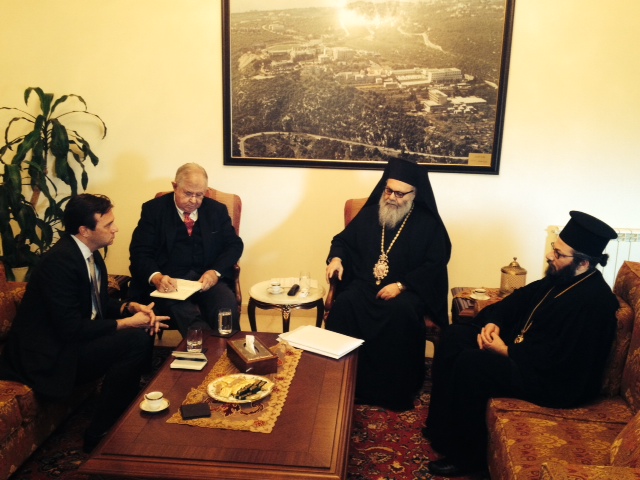Beirut. Qatar. Jordan. Egypt. Oman.
John B. Craig, Ambassador in Residence at the Center for Global Understanding and Peacemaking (CGUP) at Elizabethtown College, had a busy spring and summer, traveling throughout the Middle East, researching Syrian opposition, refugees and the causes of Christian migration out of the Middle East.

Ambassador John B. Craig, second from left, meeting Greek Orthodox Patriarch of Antioch in Lebanon in 2014.
The resident expert is scheduled to give a related talk, “Terrorism and the Iran Revolution: ISIS in Syria,” at 7 p.m. Monday, Sept. 8 at the College; the event is free and open to the public.
This event—and seemingly ever-escalating tensions in the Middle East—brings Craig’s expertise into the forefront. E-town NOW spent some time learning about this well-traveled, multilingual asset to the College. As part of his role at the College—as well as his duties as a professional consultant— Craig says he travels aggressively, meeting people and finding cocurricular opportunities to bring the world to Elizabethtown or vice versa.
His travels are partially devoted to finding speakers and programs to augment courses, particularly in the international studies, international business, political science, Asian studies and peace and conflict studies curriculums. And, sometimes, he is the speaker. For example, he says that a professor might come to him if he or she is doing a unit on the Model U.N. and needs a guest—Craig spent time at the United Nations in Iraq in the ’90s.
The Ambassador also helps Center director Dr. David Kenley and other staff members develop and organize CGUP programming, including last year’s Ware Seminar, which brought several guests, including “two of the world’s greatest cyber security experts,” to campus for a packed-house event. Craig said these specialists were happy to speak on campus: “When [speakers] come to the college, it’s with the idea that they want to educate the next generation.” He also played a role in the College’s first NGO Conference, a CGUP-sponsored event that brought representatives from non-governmental organizations to campus for sessions and a career/internship fair.
“At some point, people get interested in international affairs and want to get really involved. There are so many ways you can live and work overseas, so much more so than when I was 21,” he said, of why the NGO job fair was relevant to Elizabethtown students.
Craig also helped secure Nobel Laureates Muhummad Yunus and Tawakkol Karman, the guests at the 2012 and 2013 Ware Lectures, respectively. Speakers of this caliber are a big deal, he said, citing that they might only participate in four to five speaking engagement of this type a year—and Elizabethtown was one of them.
“We’ve made great strides in student participation,” he said, of the work the CGUP is doing.
The Northeast to the Middle East – to Central Pa.
Ambassador Craig graduated from the School of International Service at American University and the National Defense University, both in Washington, D.C. His educational goal was to be able to take and pass the Foreign Service exam so that he could serve as a diplomat, which he did—he took his first post just five days after he graduated.
“I’m still the youngest to have joined [the foreign service],” he said, adding that passing the exam while he was still a senior in college, between his 21st and 22nd birthday, was “unusual.”
He went on to work for 35 years, “from one post to another,” in the Middle East. In 1998, he was appointed by President Bill Clinton as U.S. Ambassador to Oman, and he also was a special assistant to President George W. Bush in 2001.
Although his connection to E-town extends further back—his grandmother was part of the first graduating class—Craig has been officially affiliated with the College since 2002. When former E-town president Theodore E. Long found out Craig was a resident of Elizabethtown, Long said something along the lines of, according to Craig, “You can’t have the experience you have and live right here and not do something.” Long invited Craig to become a Scholar in Residence at the College. In 2010, he was named Ambassador in Residence in the Center for Global Citizenship—now known as CGUP.
Craig’s involvement in Washington, D.C., continues. The Center for American Progress, a nonpartisan research and educational institute headquartered in Washington, D.C., in September 2014, appointed Craig as a Senior Fellow (non-resident) with the National Security and International Policy department at the Center. A press release from the Center for American Progress explains that the organization is “dedicated to promoting a strong, just and free America that ensures opportunity for all.”
Why the Middle East Matters
When asked why happenings in the Middle East are important, and why it is relevant to people in the United States, Craig said that one way of understanding is to look at it through an “intellectual point of view.”
“If there is any interest left in history and what history can teach us, the Middle East is a natural place,” he said, explaining that “great religions were born in a place that does not share our value.”
There’s the question now, he explains, of watching a major section of the world finding its way—“the way we did”—through the American Revolution and Civil War. “Our history wasn’t very pretty then either,” he said.
“People in the Middle East are deprived of the opportunity to express themselves. As a country and as individuals,” he said, then asking: “How can it sort out? Is there anything we can do to influence that?”
There is no quick solution he said. But those are the kinds of questions that inform his research, his travels and his evolving role as Ambassador in Residence at Elizabethtown College’s Center for Global Understanding and Peacemaking.

